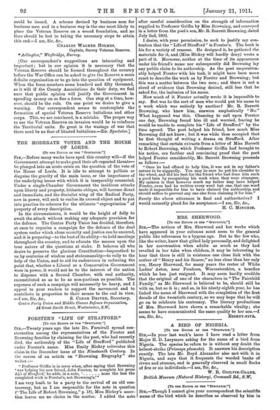FORSTER'S "LIFE OF STRAFFORD."
[To THE EDITOR OF THE "SPECTATOR.") Sta,—Twenty years ago the late Dr. Furnivall spread con- sternation among the representatives of the Forster and Browning families by claiming for the poet, who had recently died, the authorship of the "Life of Strafford" published under Forster's name. Miss Emily Hickey reiterates this claim in the December issue of the Nineteenth Century. In
the course of an article on "Browning Biography" she writes :-
" Professor Griffin is in error when, after saying that Browning ' was helping his new friend, John Forster, to complete his prose Life of Strafford,' he adds, in a note, ` none the less the completed work is Forster's, not Brovrning's.'"
I am very loath to be a party to the revival of an old con- troversy, but as I am responsible for the note in question (" The Life of Robert Browning," p. 18), Miss Hickey's asser- tion leaves me no choice in the matter. I added the note after careful consideration on the strength of information supplied to Professor Griffin by Miss Browning, and conveyed in a letter from the poet's son, Mr. R. Barrett Browning, dated July 2nd, 1902.
I desire, with your permission, to seek to justify my con- tention that the " Life of Strafford" is Forster's. The book is his for a variety of reasons. He designed it, he gathered the materials for it, and (Miss Hickey will hardly deny) wrote a
part of it. Moreover, neither at the time of its appearance under his friend's name nor subsequently did Browning lay any public claim to its authorship. As the poet unquestion- ably helped Forster with his task, it might have been more exact to describe the work as by Forster and Browning; but this was a matter between the two men ; and there is not a shred of evidence that Browning desired, still less that he asked for, the inclusion of his name.
How much of it Forster actually wrote it is impossible to say. But was he the sort of man who would put his name to a work which was entirely by another? Mr. R. Barrett Browning, who knew him, answers emphatically "No." What happened was this. Chancing to call upon Forster one day, Browning found him ill and worried, fearing he
would be unable to complete his "Life of Strafford" by the time agreed. The poet helped his friend, how much Miss
Browning did not know ; but it was while thus occupied that he first thought of writing a drama on Strafford. After remarking that certain extracts from a letter of Miss Barrett
to Robert Browning, which Professor Griffin had brought to his notice, are further and convincing proof that the poet helped Forster considerably, Mr. Barrett Browning proceeds as follows :—
" Once ho had offered to help him, it was not in my father's nature to be niggardly. You may be sure he put his shoulder to the wheel, and did his best for the friend who had done him such a good turn by recognising his work when they were strangers. My opinion is that however much my father may have helped Forster, even had he written every word but one, that one word made it impossible for him to have claimed the authorship, and should suffice to prevent any one else from claiming it for him."
Surely the above utterance is final and authoritative P I would earnestly plead for its acceptance.—I am, Sir, &c., H. C. MiNclar.










































 Previous page
Previous page